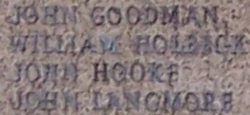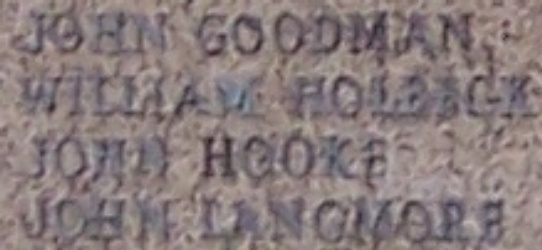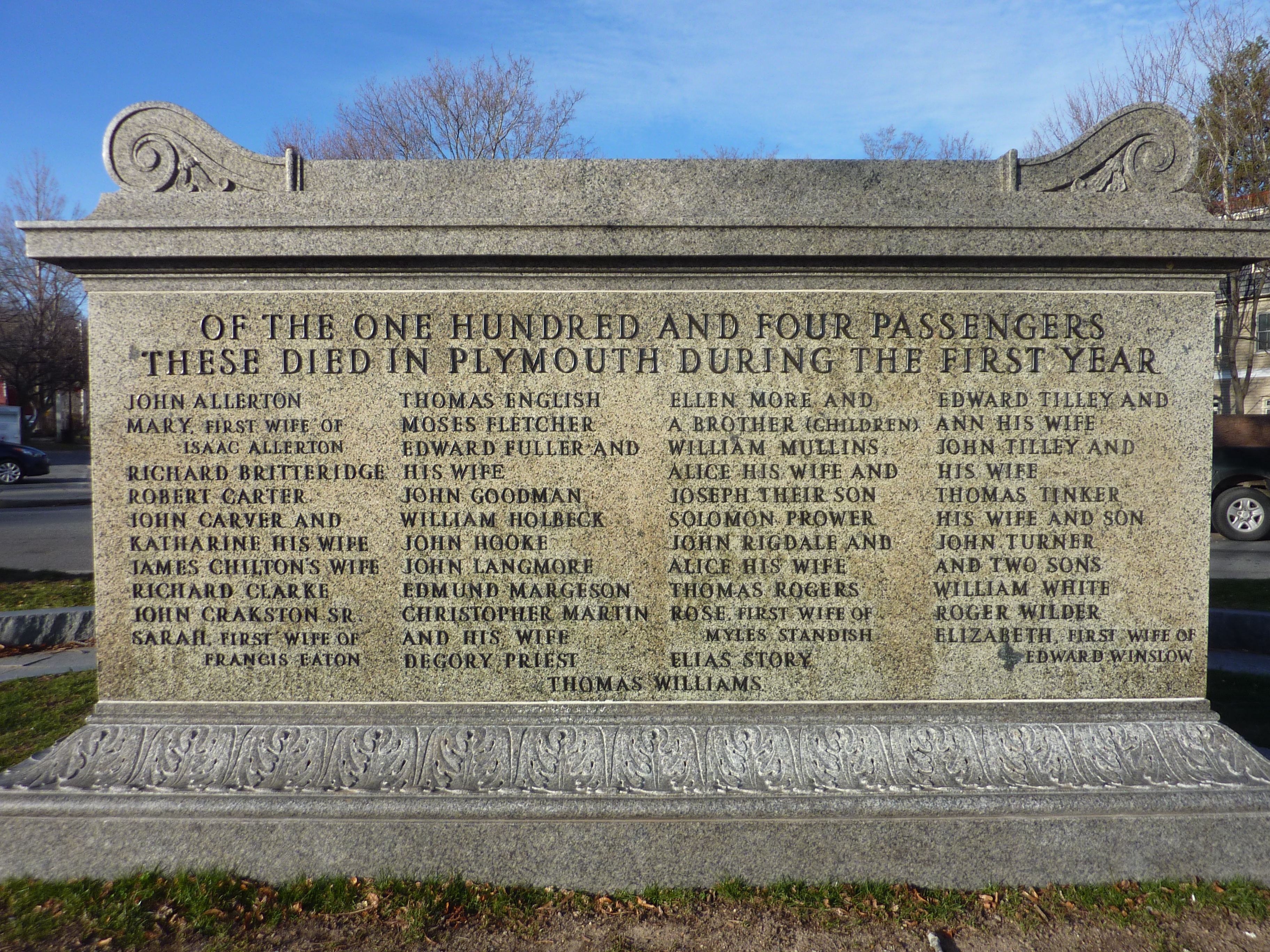John Goodman's English origins remain unknown. There is a marriage record in Holland of a "Jan Codmoer" of England marrying Sarah Hooper just a year before the Mayflower voyage, and having been witnessed by Mayflower passenger Samuel Fuller. However, this remains our only clue. Upon arriving in Plymouth, John Goodman signed the Mayflower Compact. Later one of his fellow passengers recorded this story of him on January 12, 1620/1:
John Goodman and Peter Brown, having cut thatch all the forenoon, went to a further place, and willed the other two, to bind up that which was cut and to follow them; so they did, being about a mile and a half from our plantation; but when the two came after, they could not find them, nor hear anything of them at all, though they hallowed and shouted as loud as they could, so they returned to the company and told them of it: whereupon Master Leaver and three or four more went to seek them, but could hear nothing of them.
These two that were missed, at dinner time took their meat in their hands, and would go walk and refresh themselves, so going a little off they find a lake of water, and having a great mastiff bitch with them and a spaniel; by the waterside they found a great deer, the dogs chased him, and they followed so far as they lost themselves, and could not find their way back. They wandered all that afternoon being wet, and at night it did freeze and snow, they were slenderly appareled and had no weapons but each one his sickle, nor any victuals. They ranged up and down and could find none of the savage's habitations; when it drew to night they were much perplexed, for they could find neither harbor nor meat, but in frost and snow, were forced to make the earth their bed, and the element their covering. And another thing did very much terrify them, they heard as they thought two lions roaring exceedingly for a long time together, and a third, that they thought was very near them, so not knowing what to do, they resolved to climb up into the tree as their safest refuge, though that would prove and intolerably cold lodging; so they stood at the tree's root, that when the lions came they might take their opportunity of climbing up. The bitch they were fain to hold by the neck, for she would have been gone to the lion; but it pleased God so to dispose, that the wild beasts came not; so they walked up and down under the tree all night. It was an extremely cold night, so soon as it was light they traveled again... In the afternoon, it pleased God from a high hill they discovered the two isles in the bay, and so that night got to the plantation, being ready to faint with travel and want of victuals, and almost famished with cold. John Goodman was fain to have his shoes cut off his feet, they were so swelled with cold, and it was a long while after ere he was able to go.
He apparently had not learned his lesson, because just a week later he again went out for a walk with his dog and was faced once again with danger. The adventure is recorded once again by a Mayflower passenger:
This day in the evening, John Goodman went abroad to use his lame feet, that were pitifully ill with the cold he had got, having a little spaniel with him. A little way from the plantation, two great wolves ran after the dog, and the dog ran to him and betwixt his legs for succor. He had nothing in his hand but took up a stick, and threw at one of them and hit him, and they presently both ran away, but came again. He got a pale board in his hand, and they sat both on their tails, grinning at him a good while, and went their way and left him.
Although William Bradford wrote that John Goodman died of sickness soon after this incident, this may have not been the case as he received a share in the 1623 division of land, although this may have been in name only. Some researchers have suggested that this land was set aside for John's children whom he left behind in Holland. Although likely that John Goodman did have children, whether any survived to adulthood or what their named are, remains a mystery.
John Goodman's English origins remain unknown. There is a marriage record in Holland of a "Jan Codmoer" of England marrying Sarah Hooper just a year before the Mayflower voyage, and having been witnessed by Mayflower passenger Samuel Fuller. However, this remains our only clue. Upon arriving in Plymouth, John Goodman signed the Mayflower Compact. Later one of his fellow passengers recorded this story of him on January 12, 1620/1:
John Goodman and Peter Brown, having cut thatch all the forenoon, went to a further place, and willed the other two, to bind up that which was cut and to follow them; so they did, being about a mile and a half from our plantation; but when the two came after, they could not find them, nor hear anything of them at all, though they hallowed and shouted as loud as they could, so they returned to the company and told them of it: whereupon Master Leaver and three or four more went to seek them, but could hear nothing of them.
These two that were missed, at dinner time took their meat in their hands, and would go walk and refresh themselves, so going a little off they find a lake of water, and having a great mastiff bitch with them and a spaniel; by the waterside they found a great deer, the dogs chased him, and they followed so far as they lost themselves, and could not find their way back. They wandered all that afternoon being wet, and at night it did freeze and snow, they were slenderly appareled and had no weapons but each one his sickle, nor any victuals. They ranged up and down and could find none of the savage's habitations; when it drew to night they were much perplexed, for they could find neither harbor nor meat, but in frost and snow, were forced to make the earth their bed, and the element their covering. And another thing did very much terrify them, they heard as they thought two lions roaring exceedingly for a long time together, and a third, that they thought was very near them, so not knowing what to do, they resolved to climb up into the tree as their safest refuge, though that would prove and intolerably cold lodging; so they stood at the tree's root, that when the lions came they might take their opportunity of climbing up. The bitch they were fain to hold by the neck, for she would have been gone to the lion; but it pleased God so to dispose, that the wild beasts came not; so they walked up and down under the tree all night. It was an extremely cold night, so soon as it was light they traveled again... In the afternoon, it pleased God from a high hill they discovered the two isles in the bay, and so that night got to the plantation, being ready to faint with travel and want of victuals, and almost famished with cold. John Goodman was fain to have his shoes cut off his feet, they were so swelled with cold, and it was a long while after ere he was able to go.
He apparently had not learned his lesson, because just a week later he again went out for a walk with his dog and was faced once again with danger. The adventure is recorded once again by a Mayflower passenger:
This day in the evening, John Goodman went abroad to use his lame feet, that were pitifully ill with the cold he had got, having a little spaniel with him. A little way from the plantation, two great wolves ran after the dog, and the dog ran to him and betwixt his legs for succor. He had nothing in his hand but took up a stick, and threw at one of them and hit him, and they presently both ran away, but came again. He got a pale board in his hand, and they sat both on their tails, grinning at him a good while, and went their way and left him.
Although William Bradford wrote that John Goodman died of sickness soon after this incident, this may have not been the case as he received a share in the 1623 division of land, although this may have been in name only. Some researchers have suggested that this land was set aside for John's children whom he left behind in Holland. Although likely that John Goodman did have children, whether any survived to adulthood or what their named are, remains a mystery.
Advertisement
Records on Ancestry
Sponsored by Ancestry
Advertisement




